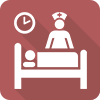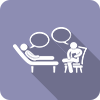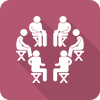- Signs and Symptoms of Ketamine Abuse
- What Are the Effects of Abuse?
- Combining with Other Substances
- How is Ketamine Abuse Diagnosed?
- Who is at Risk for Ketamine Addiction?
- When to Seek Help
- Help for Addicted Friends and Family
- Ketamine Rehab and Treatment Options
- Outpatient programs
- Teen Ketamine Abuse and Addiction
What is Ketamine?
Ketamine, a powerful anesthetic often used in veterinary medicine, saw its first surge in popularity in the 1970s, and since that time, has steadily come into and out of fashion as a recreational drug every few years.
It's increasingly less common in medical settings, but its legal status as an anesthetic has made it easier for some addicts to continue accessing this dangerous drug.
Signs and Symptoms of Ketamine Abuse
Ketamine is an anesthetic, which means that it slows down reaction times, depresses activity in the brain and spinal cord, and often causes memory loss. These side effects are also the factors that make it a popular date rape drug.
Some other signs of ketamine use include:
- Loss of muscle control.
- Sudden changes in behavior.
- Sluggish, apathetic, or negligent behavior.
- Difficulty remembering recent events.
- Frequently disappearing to use ketamine.
- Changes in academic or job performance.
- Seeming detached from reality.
- Nausea.
- Difficulty talking or concentrating.
Every 107 seconds in the United States, a person is sexually assaulted.
55% of rape victims are drugged at the time of the rape and a significant portion of them have taken ketamine.
Ketamine is one of the most popular and accessible date rape drugs. It's also extremely difficult to detect that you've been drugged with ketamine. However, ketamine's uses aren't just limited to date rapes.
What Are the Effects of Abuse?
Ketamine is an extraordinarily dangerous drug, and even a single use has the power to get a user hooked. It's easy to overdose on, and even "proper" use of the drug results in markedly diminished physical, intellectual and emotional capacity.
Therapists are Standing By to Treat Your Depression, Anxiety or Other Mental Health Needs
Explore Your Options Today
Ad
Some of the most common effects of ketamine use include:
- Sexual victimization.
- Loss of memories.
- Changes in finances.
- On-the-job difficulties.
- Difficulty concentrating.
-
Insomnia without ketamine.
- Changes in mental health.
- Accidental overdose.
- Coma, stroke and sudden death.
- Changes in muscle tone or an increase in muscle weakness.
- Dizziness.
- Low blood pressure.
- Chronic, unexplained gastrointestinal problems.
- Believing things that aren't true (delusions).
- Seeing things that aren't there (hallucinations).
- Chronic fatigue.
- Decreased immunity.
- Increased dependence on ketamine.
Combining with Other Substances
Mixing ketamine with any other drug is an extraordinarily dangerous undertaking.In medical settings, ketamine is often mixed with other drugs to increase drowsiness or prolong the effects of anesthesia. When used recreationally, though, the sophisticated technology that doctors have is not available, which means that mixing ketamine with any other drug is an extraordinarily dangerous undertaking.
Users who take ketamine alongside sleeping pills, painkillers or depressants such as alcohol may experience:
- Difficulty breathing.
- A dangerous drop in blood pressure.
-
Cardiac arrest.
If you try to counteract the effects of ketamine by taking stimulant drugs or amphetamine, you can experience:
- Dangerous heart arrhythmia.
- Psychotic behavior.
- Seizures.
- Accidental overdose.
Many people who ultimately die due to a drug addiction do so after combing multiple drugs. Don't become a statistic. If you're addicted to ketamine, seek help. Never, ever combine the drug with any other medication and, if your doctor prescribes a medication, make sure he or she knows that you're addicted to ketamine.
How is Ketamine Abuse Diagnosed?
Though Ketamine has some legitimate medical uses, it
should never be used at home without the assistance of a doctor. Likewise, any recreational use of this drug constitutes a form of abuse.
If you experience pain, vomiting, headaches, gastrointestinal distress, or severe emotional turmoil when you attempt to quit using, your abuse has become an addiction.
Who is at Risk for Ketamine Addiction?
Compared to conventional drugs--like cocaine, marijuana and alcohol--ketamine is more challenging to obtain. Being in a field where ketamine is readily accessible, then, is a risk factor for addiction.
Doctors, veterinarians and other medical professionals who regularly have access to ketamine are more likely to become addicts, especially when they face other addiction risk factors.
Some other risk factors for addiction include:
-
Addiction in your family: This involves learning how to cope through modeling and social influence, along with a genetic predisposition to addictive disorders.
-
Stress and dysfunction: People in bad marriages, those living in poverty, and anyone facing chronic stress are more likely to become addicts.
-
Mental illness: Some people turn to drugs in order to alleviate the symptoms of mental health problems.
-
A history of trauma: Domestic violence, child abuse, or rape.
Of course, the single most significant ketamine addiction risk factor is using ketamine. Frequent use of the drug almost inevitably leads to addiction, and some users are shocked by how quickly they grow dependent on this potentially dangerous substance.
When to Seek Help
There is no safe level of ketamine use, and if you're using ketamine to get high, you're breaking the law. Thus, the best time to seek treatment for a ketamine addiction is today since the ongoing danger of addiction means that tomorrow might never come.
Many ketamine addicts struggle to admit that they have a problem. If you've continued using ketamine in spite of the risks, though, it's a sure sign you need help.
Some other symptoms that it's time to seek help include:
- Doing things you regret while under the influence of ketamine or in an attempt to get ketamine.
- Ignoring people you love in favor of ketamine.
- Neglecting your job, education, or favorite hobbies because of ketamine.
- Using ketamine to cope with mental or physical illness.
- Experiencing ketamine-related health, financial, or legal difficulties.
- Loved ones asking you to please seek help.
- Driving while under the influence of ketamine.
- Difficulty feeling "normal" without ketamine.
- Endangering yourself or people you love because of ketamine.
To find our more about the treatment options available in your area, call our confidential hotline at
1-888-993-3112Who Answers?.
It is never too late to seek help.
Help for Addicted Friends and Family
 Get support from Narcotics Anonymous, a 12-step program that helps those with an addiction to ketamine or another drug. Find a meeting for you or your loved one.
Get support from Narcotics Anonymous, a 12-step program that helps those with an addiction to ketamine or another drug. Find a meeting for you or your loved one.
If someone you love is an addict, it is their responsibility to seek treatment. You can't save him or her, and forcing an addict into treatment is a recipe for disaster.
Knowing that addiction is a disease, though, can help you be more sympathetic to the challenges your loved one faces. No one wants to be an addict, but the pain of withdrawal can be daunting. If your loved ones suffer from mental illness, trauma, or ongoing stress, he or she may wonder how to survive without ketamine.
Treatment saves lives every day, so the very best thing you can do for your loved one is encourage them to seek treatment. Offer your unconditional love and support, but don't become an enabler. Giving an addict money, a place to stay, or drugs when he or she is unwilling to get sober only makes it easier to be an addict.
When addiction is easy, addicts have little incentive to seek the treatment they so desperately need. It can be hard to reject the pleas for help of someone you love, and you don't have to kick your loved one to the curb. But "helping" an addict is often harmful.
Ketamine Rehab and Treatment Options
If you're worried that you might be an addict, don't waste precious time delaying treatment. Ketamine addiction gets worse over time, but a vast array of treatment options can help you recover.
Inpatient Treatment Options
-

Rehab is an ideal option for recovery since you'll get 24/7 support and be able to escape the stress you face at home. You'll also get therapy, a chance to seek help from other recovering addicts, and first-rate medical care. The key to success in rehab is choosing a facility where you feel comfortable and safe, and where your values are respected.
-

Addicts are increasingly abandoning the bare-bones model of rehab in favor of luxurious, resort-style accommodations. Luxury facilities offer excellent meals, plenty of entertainment, beautiful settings, and holistic orientation toward wellness. At many facilities, you'll have a spacious and private room.
-

However, it's not just luxury rehab facilities that are gaining traction. Anyone can develop a ketamine addiction, including high-profile figures and busy executives. If you're concerned that rehab could undermine your career prospects, executive programs blend the comfort of a luxury facility with a business-friendly climate where you can meet with clients and get your work done.
Outpatient programs
If you can't afford rehab or prefer to try a less drastic measure, you're in luck. Outpatient care can be extraordinarily effective, especially when you try several different programs at once. Your treatment options include:
-

Medical assistance: Your doctor will assess your health, and then devise a treatment plan to help you get sober. He or she may also make treatment recommendations to combat any underlying health problems, particularly those that contribute to your addiction.
-

Therapy can help you assess why you're an addict, what you can do to resist cravings, and how you can build healthier coping skills. You can also work on relapse prevention.
-

12-step programs: By working the steps, you get steadily closer to recovery, all with the support of other addicts who get it and have been there. Many people find the support of these groups extremely valuable.
-

Intensive outpatient programs: These programs, sometimes referred to as partial hospitalization, offer many of the services you'll find in rehab. These include support groups, therapy, and medical care, for example--but take place during the day. You'll typically attend sessions 3-6 days per week, and be able to return home at night.
Teen Ketamine Abuse and Addiction
Teens and young adults are more likely to try ketamine than any other age group, but the use of the drug remains relatively low. About 2% of 12th graders have used the drug at least once, and less than 1% report using it in the last month.
Ketamine is highly addictive for teenagers, whose brains and bodies are not fully developed and who can suffer permanent neurological deficits as a result of ketamine use.
If you care about a teen who is addicted to ketamine, know that you can't punish or bribe him or her into getting clean. The only option is drug treatment, which not only helps get a teen clean, but also works to counteract any developmental effects of ketamine, such as memory loss or difficulty controlling emotions. Parents must act quickly to get help for their children, even if that means earning a child's anger.
If you're concerned that your teen may be abusing ketamine, help is available. Our treatment support team is here 24-hours a day to help you find appropriate treatment services for your son or daughter.
Call us toll-free at
1-888-993-3112Who Answers? and get your child the help they need.
As advocates of mental health and wellness, we take great pride in educating our readers on the various online therapy providers available. MentalHelp has partnered with several thought leaders in the mental health and wellness space, so we can help you make informed decisions on your wellness journey. MentalHelp may receive marketing compensation from these companies should you choose to use their services.
MentalHelp may receive marketing compensation from the above-listed companies should you choose to use their services.
Ad





